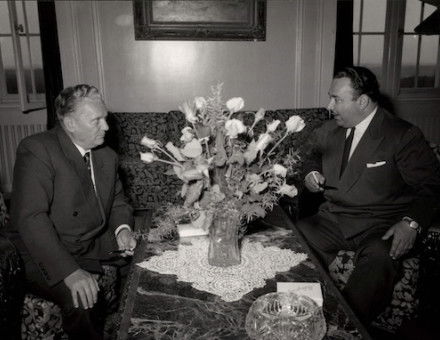Death of Guiseppe Verdi
Guiseppe Verdi, described by the Italian parliament as 'one of the highest expressions of the national genius' died on January 27th, 1901, aged 87.

The last act of which the composer of Aida and Don Carlos, Rigoletto and Otello seems to have been conscious was buttoning up his waistcoat. Giuseppe Verdi spent his last Christmas and saw in his last New Year in the comfort of his suite at the Grand Hotel in Milan. Eighty-seven-years-old, he was in vigorous health, though he would sometimes wonder aloud why he was still in this world. He could no longer take the long walks he loved, though a late photograph caught him in his black overcoat and top hat one day, long-sightedly scanning a newspaper as he walked past La Scala. His librettist and old friend Arrigo Boito wrote that ‘we were all brightened by the sunshine of that Olympian old age.’
On the morning of January 21st, however, as he sat on his hotel bed dressing, he began to shake, said to the maid, ‘One button more or one button less’ and was knocked unconscious by a stroke. As word spread, straw was laid on the cobbled street outside to muffle the sound of horses and carriages, and tram conductors were instructed not to ring the bell as they passed the building. Crowds stood silently in the street and friends waited anxiously in the hotel, which opened a special press office and posted regular bulletins on a board outside. Verdi never regained consciousness. He died at ten to three on the morning of the 27th, his adopted daughter Maria and his old friend, the soprano Teresa Stolz, at his bedside.
Most of the shops in Milan closed for three days and La Scala and all the theatres closed, while the Italian parliament lamented the loss of ‘the heroic symbol of our Risorgimento’ and ‘one of the highest expressions of the national genius’. Verdi had left instructions for a modest burial in Milan’s municipal cemetery beside his wife Giuseppina, who had died in 1897. It was to be held at dawn or in the evening and without flowers, music or singing. His wishes were respected, but he had underestimated the immense esteem in which he was held by Italians. At seven o’clock on the damp, misty morning of January 30th, as a hearse bore his coffin to the cemetery, some of the crowd along the route apparently began to sing the great ‘Va, pensiero’ chorus from Verdi’s opera Nabucco, which had stopped the show on the first night at La Scala in 1842: ‘Va, pensiero, sull’ali dorate’ (‘Fly, thought, on wings of gold’). After unification, ‘Va, pensiero’ had become almost a national anthem of the new Italy. In the song of the exiled Jews lamenting their lost homeland, Italians were able to hear poignantly echoed their own longing for freedom from foreign rule.
A month later, on February 26th, Verdi and his wife’s coffins were moved to the newly completed Casa di Riposa per Musicisti (Musicians’ House of Rest) in what amounted to a state funeral. Some 300,000 people crammed the streets of Milan as the immense funeral carriage, drawn by six horses, passed in slow procession, followed by a cortège of leading politicians and dignitaries, foreign representatives, and officials from numerous Italian cities. Six carriages bore wreaths and floral tributes. As the procession left the cemetery, ‘Va, pensiero’ was sung by a chorus 800 strong, conducted by Toscanini, and when the cortège reached the Casa di Riposa, it was greeted by the ‘Miserere’ from Il Trovatore.
Verdi was born in the heyday of Beethoven. In a golden age of great music he was the contemporary of Wagner, Brahms and Tchaikovsky, all of whom he outlived. Verdi had lived through the creation of modern Italy as an independent country, a cause to which he was passionately committed. How far his early operatic successes in the 1840s appealed directly to Italian nationalist sentiment at the time has been questioned, but they certainly did in retrospect and he was elected to the first Italian parliament in 1861, though he rarely attended. The veneration in which he was held by his countrymen was a tribute to the position he had achieved as a figurehead of Italian national pride as much as to the glory of his music.




